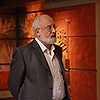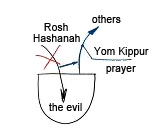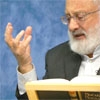The Gate Of Prayer
 In order to reach a new degree I need to acquire an additional desire, heaviness of the heart. I can then scrutinized it and make an appeal with a completed prayer by realizing that I cannot remain in this egoism, that what I’m missing is the quality of bestowal. I don’t tell the Creator that I’m feeling bad and ask Him to make things better for me. My prayer can only be this: “It is good that You have given me this evil so that I can understand how to desire bestowal and rise to love of others.”
In order to reach a new degree I need to acquire an additional desire, heaviness of the heart. I can then scrutinized it and make an appeal with a completed prayer by realizing that I cannot remain in this egoism, that what I’m missing is the quality of bestowal. I don’t tell the Creator that I’m feeling bad and ask Him to make things better for me. My prayer can only be this: “It is good that You have given me this evil so that I can understand how to desire bestowal and rise to love of others.”
I don’t ask for the evil to be taken away because it is the only foundation that I can use to build upon, or else I would remain a beast. Instead, I must examine this evil, this sensation of emptiness, so as to recognize it as help against my egoism, compelling me to connect to others.
I give thanks for the “evil” and hope that it stays because otherwise I would fall back into my egoism. But above the evil, I want to build an attitude of bestowal toward everybody else. And therefore, I view the evil as a helper which frees me from my egoistic desires since the feeling of unpleasantness allows me to disconnect from them.
If a person burned himself, then he would no longer want to touch the object that burned him. Similarly, I begin to no longer want these desires and, above them, I build an attitude of bestowal. This requires a new beginning, Rosh Hashanah (A New Year), a state when I no longer desire past fulfillments because I feel them as evil. On the contrary, above it, I now want to build an attitude of bestowal to others. This transformation, the transition from one to the other, is called the Beginning of a New Year.

And then, after verifying that I am unable to do it on my own, I arrive at Yom Kippur, having only the desire but feeling that I lack the strength. That is how I arrive at the prayer, and this is called the Day of Atonement. In this state I don’t judge the Creator, but rather myself because I lack the strength to bestow, and herein lies my sin.
This is what I scream about on Yom Kippur when I atone for all my “sins.” The true meaning of the Day of Atonement is the revelation of the Kli that is ready for correction. It is a turning point on Rosh Hashanah when I decide to reject the old desire, and approach and resolve to strive for bestowal. But in the 10 days from Rosh Hashanah to Yom Kippur I have verified that I am incapable of bestowal. And now for the first time, I turn to the Creator with a genuine appeal and achieve contact with Him.
This appeal reaches Him at last because I do not request fulfillment, only the force of correction. And so I arrive at the gate of prayer.
From the 4th part of the Daily Kabbalah Lesson 9/15/10, Excerpts on Yom Kippur
Related Material:
Laitman.com Post: The Gate Of Tears Is A Joyful Prayer
Laitman.com Post: Help Against You
Laitman.com Post: The Day Of Atonement Is A Day Of Joy










